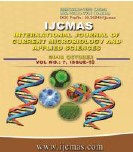


 National Academy of Agricultural Sciences (NAAS)
National Academy of Agricultural Sciences (NAAS)

|
PRINT ISSN : 2319-7692
Online ISSN : 2319-7706 Issues : 12 per year Publisher : Excellent Publishers Email : editorijcmas@gmail.com / submit@ijcmas.com Editor-in-chief: Dr.M.Prakash Index Copernicus ICV 2018: 95.39 NAAS RATING 2020: 5.38 |
The present attempt deals with analysis of conversion potential of earthworm, Eisenia fetida (L) through the use of Garbage (Garden waste) (GW), Kitchen Waste (KW) and combination of both (GW + KW). The Garbage (Garden waste) (GW); Kitchen Waste (KW) and combination of both (GW + KW) were subjected for recycling through vermicomposting through the using the epigeic earthworm, Eisenia fetida (L) under laboratory conditions. The parameters of analysis include: pH, moisture content, total organic carbon, humus, nitrogen, phosphorous and potassium in vermicompost. The moisture content, total organic carbon, humus, nitrogen, phosphorous and potassium of vermiwash high in the vermicompost derived from combination of both (GW + KW), followed by kitchen waste (KW) and garden waste (GW). This attempt is demonstrating, the potential of earthworm species and the type of wastes utilized. Role of soil microbes and earthworms are responsible for the recycling and biochemical degradation of organic matter. The earthworms are the important ecological drivers for the process by conditioning the substrate and altering the biological activity. However, the quality of the end product varies according to the composition of the initial mixture being processed.
 |
 |
 |
 |
 |